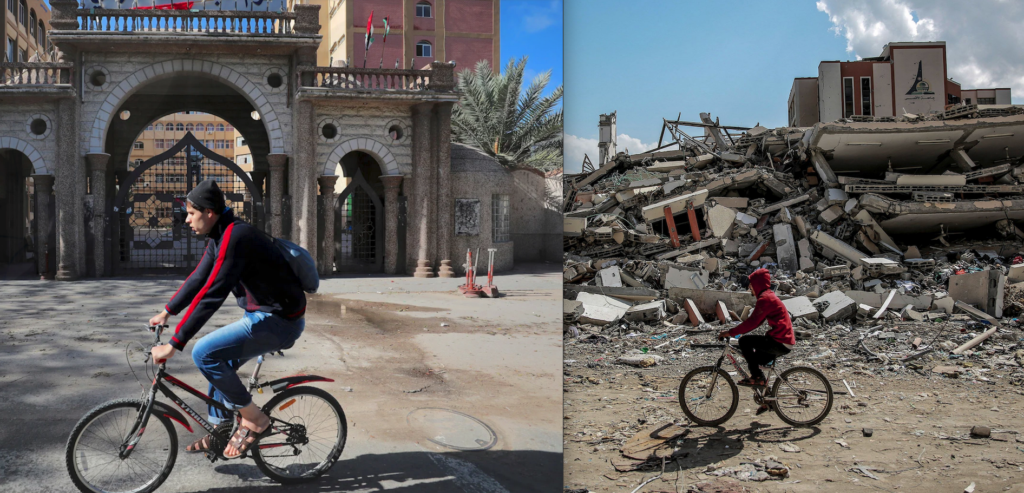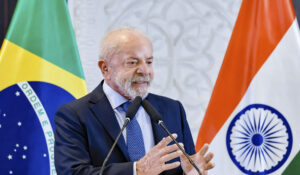
Published 09/09/2024 15:50 | Edited 09/09/2024 16:21
While the start of the new school term is celebrated in many parts of the world, in Gaza, the reality for more than 620,000 Palestinian students is marked by devastation and uncertainty. Since the start of the latest conflict launched by Israel on October 7 last year, the educational situation in the Gaza Strip has deteriorated significantly.
A recent United Nations alert indicates that 85% of school buildings in Gaza have been damaged or destroyed by Israeli strikes. According to the United Nations Office for the Coordination of Humanitarian Affairs (OCHA), around 625,000 students have been deprived of access to education. In addition, the report reveals that almost 30,000 students and educators have been killed or injured since the beginning of the conflict, including 9,839 students and 411 education workers.
The report also highlights that in July, 477 of the 564 schools in Gaza were directly attacked or damaged. These buildings are in need of complete reconstruction, and the impact on school infrastructure is devastating. With a total of 15,394 students and 2,411 education workers injured, the destruction goes far beyond the physical, profoundly affecting the lives and futures of children and young people.
Cultural and educational impact
The destruction of educational and cultural institutions in Gaza is a significant loss for Palestinian society. Every school and university bombed represents the loss of educational resources, research and opportunities for future generations. Furthermore, the destruction of 195 heritage sites, 227 mosques and three churches, as well as the elimination of central archives containing 150 years of history, represents an attack on the Palestinian collective memory.
In response to the crisis, the Palestinian Ministry of Education is offering online and in-person classes in tents in an attempt to minimize educational disruption. However, widespread destruction continues to severely limit access to formal education.
Several Palestinian educational organizations and institutions have called on the international community and the United Nations to take action to protect the education sector in Gaza and call for an immediate ceasefire. Philippe Lazzarini, Commissioner-General of UNRWA, stressed the importance of education as a fundamental right and a form of resistance.
Scholasticide: systematic destruction of education
The concept of scholasticide describes the deliberate destruction of Palestinian educational and cultural institutions. Since 1948, systematic attacks on educational and cultural infrastructure have been part of a broader strategy to dismantle the ability of Palestinians to maintain their identity and resist occupation.
The destruction is not limited to buildings and books, but affects the social cohesion and future of Palestinian society. Every destroyed school and every erased library represents a disruption in the learning process and in the preservation of Palestinian history and culture.
Amidst this devastation, Schools Without Borders has emerged as a symbol of hope and resilience. These institutions set up in refugee camps offer a form of learning adapted to the harsh conditions, incorporating innovative methods to keep children engaged through games and sports, and teaching Arabic, math and English. Despite the constant displacement and challenges, these schools continue to provide education and hope for the children of Gaza.
Reconstruction and international support
Rebuilding Gaza’s educational infrastructure is essential, and the involvement of Palestinian educators and researchers is crucial to ensuring that reconstruction meets local needs. Support initiatives in the US are creating opportunities for Palestinian students, offering online courses and ongoing support. Many Palestinian refugees from the war continue their education in the US after deeply traumatic experiences of displacement.
The struggle for education in Gaza is a struggle for dignity and cultural identity. Even in the face of extreme challenges, the determination of Palestinians to keep education alive is a testament to the strength and resilience of the Palestinian people. Education is not just a form of resistance, but a path to a better future, even in times of crisis.
Source: vermelho.org.br

